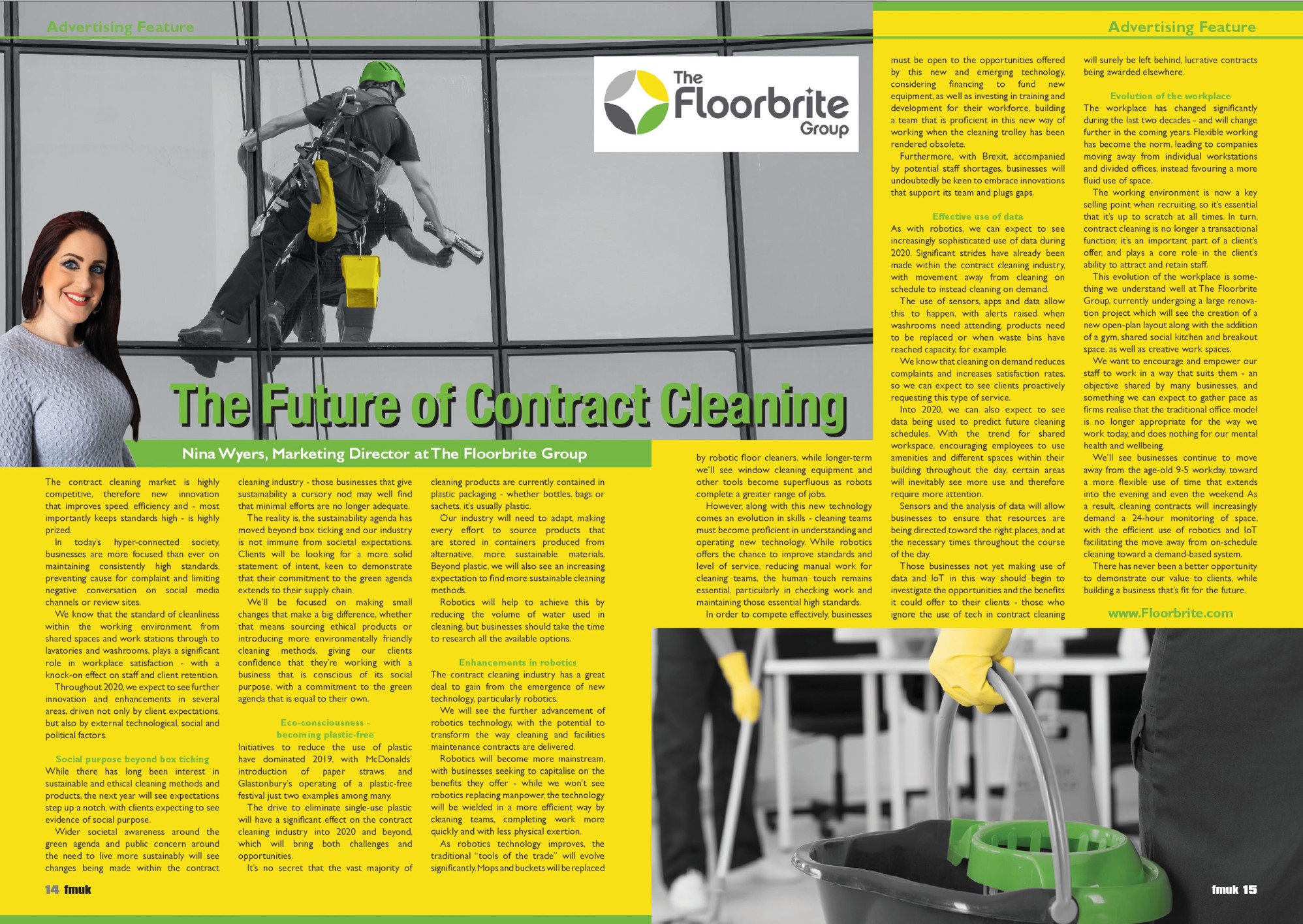The Future of Contract Cleaning
 Nina Wyers, Marketing Director at The Floorbrite Group
Nina Wyers, Marketing Director at The Floorbrite Group
The contract cleaning market is highly competitive, therefore new innovation that improves speed, efficiency and - most importantly keeps standards high - is highly prized.
In today’s hyper-connected society, businesses are more focused than ever on maintaining consistently high standards, preventing cause for complaint and limiting negative conversation on social media channels or review sites.
We know that the standard of cleanliness within the working environment, from shared spaces and work stations through to lavatories and washrooms, plays a significant role in workplace satisfaction - with a knock-on effect on staff and client retention.
Throughout 2020, we expect to see further innovation and enhancements in several areas, driven not only by client expectations, but also by external technological, social and political factors.
Social purpose beyond box ticking
While there has long been interest in sustainable and ethical cleaning methods and products, the next year will see expectations step up a notch, with clients expecting to see evidence of social purpose.
Wider societal awareness around the green agenda and public concern around the need to live more sustainably will see changes being made within the contract cleaning industry - those businesses that give sustainability a cursory nod may well find that minimal efforts are no longer adequate.
The reality is, the sustainability agenda has moved beyond box ticking and our industry is not immune from societal expectations. Clients will be looking for a more solid statement of intent, keen to demonstrate that their commitment to the green agenda extends to their supply chain.
We’ll be focused on making small changes that make a big difference, whether that means sourcing ethical products or introducing more environmentally friendly cleaning methods, giving our clients confidence that they’re working with a business that is conscious of its social purpose, with a commitment to the green agenda that is equal to their own.
Eco-consciousness - becoming plastic-free
Initiatives to reduce the use of plastic have dominated 2019, with McDonalds’ introduction of paper straws and Glastonbury’s operating of a plastic-free festival just two examples among many.
The drive to eliminate single-use plastic will have a significant effect on the contract cleaning industry into 2020 and beyond, which will bring both challenges and opportunities.
It’s no secret that the vast majority of cleaning products are currently contained in plastic packaging - whether bottles, bags or sachets, it’s usually plastic.
Our industry will need to adapt, making every effort to source products that are stored in containers produced from alternative, more sustainable materials. Beyond plastic, we will also see an increasing expectation to find more sustainable cleaning methods.
Robotics will help to achieve this by reducing the volume of water used in cleaning, but businesses should take the time to research all the available options.
Enhancements in robotics
The contract cleaning industry has a great deal to gain from the emergence of new technology, particularly robotics.
We will see the further advancement of robotics technology, with the potential to transform the way cleaning and facilities maintenance contracts are delivered.
Robotics will become more mainstream, with businesses seeking to capitalise on the benefits they offer - while we won’t see robotics replacing manpower, the technology will be wielded in a more efficient way by cleaning teams, completing work more quickly and with less physical exertion.
As robotics technology improves, the traditional “tools of the trade” will evolve significantly. Mops and buckets will be replaced by robotic floor cleaners, while longer-term we’ll see window cleaning equipment and other tools become superfluous as robots complete a greater range of jobs.
However, along with this new technology comes an evolution in skills - cleaning teams must become proficient in understanding and operating new technology. While robotics offers the chance to improve standards and level of service, reducing manual work for cleaning teams, the human touch remains essential, particularly in checking work and maintaining those essential high standards.
In order to compete effectively, businesses must be open to the opportunities offered by this new and emerging technology, considering financing to fund new equipment, as well as investing in training and development for their workforce, building a team that is proficient in this new way of working when the cleaning trolley has been rendered obsolete.
Furthermore, with Brexit on the horizon, accompanied by potential staff shortages, businesses will undoubtedly be keen to embrace innovations that support its team and plugs gaps.
Effective use of data
As with robotics, we can expect to see increasingly sophisticated use of data during 2020. Significant strides have already been made within the contract cleaning industry, with movement away from cleaning on schedule to instead cleaning on demand.
The use of sensors, apps and data allow this to happen, with alerts raised when washrooms need attending, products need to be replaced or when waste bins have reached capacity, for example.
We know that cleaning on demand reduces complaints and increases satisfaction rates, so we can expect to see clients proactively requesting this type of service.
Into 2020, we can also expect to see data being used to predict future cleaning schedules. With the trend for shared workspace, encouraging employees to use amenities and different spaces within their building throughout the day, certain areas will inevitably see more use and therefore require more attention.
Sensors and the analysis of data will allow businesses to ensure that resources are being directed toward the right places, and at the necessary times throughout the course of the day.
Those businesses not yet making use of data and IoT in this way should begin to investigate the opportunities and the benefits it could offer to their clients - those who ignore the use of tech in contract cleaning will surely be left behind, lucrative contracts being awarded elsewhere.
Evolution of the workplace
The workplace has changed significantly during the last two decades - and will change further in the coming years. Flexible working has become the norm, leading to companies moving away from individual workstations and divided offices, instead favouring a more fluid use of space.
The working environment is now a key selling point when recruiting, so it’s essential that it’s up to scratch at all times. In turn, contract cleaning is no longer a transactional function; it’s an important part of a client’s offer, and plays a core role in the client’s ability to attract and retain staff.
This evolution of the workplace is something we understand well at The Floorbrite Group, currently undergoing a large renovation project which will see the creation of a new open-plan layout along with the addition of a gym, shared social kitchen and breakout space, as well as creative work spaces.
We want to encourage and empower our staff to work in a way that suits them - an objective shared by many businesses, and something we can expect to gather pace as firms realise that the traditional office model is no longer appropriate for the way we work today, and does nothing for our mental health and wellbeing.
We’ll see businesses continue to move away from the age-old 9-5 workday, toward a more flexible use of time that extends into the evening and even the weekend. As a result, cleaning contracts will increasingly demand a 24-hour monitoring of space, with the efficient use of robotics and IoT facilitating the move away from on-schedule cleaning toward a demand-based system.
There has never been a better opportunity to demonstrate our value to clients, while building a business that’s fit for the future.

























































